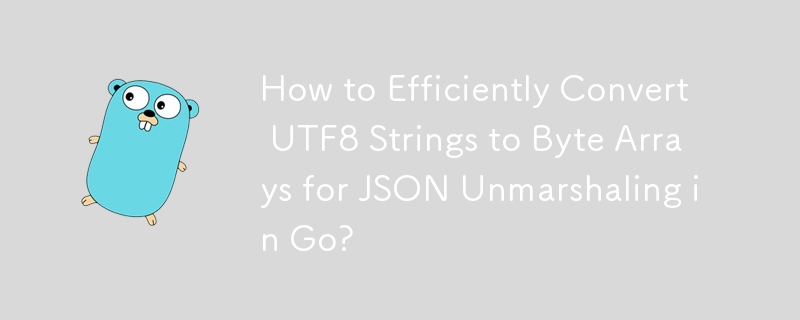Home >Backend Development >Golang >How to Efficiently Convert UTF8 Strings to Byte Arrays for JSON Unmarshaling in Go?
How to Efficiently Convert UTF8 Strings to Byte Arrays for JSON Unmarshaling in Go?
- DDDOriginal
- 2024-10-30 05:29:27866browse

Converting UTF8 Strings to Byte Arrays for JSON Unmarshaling
When unmarshaling a JSON string using the Unmarshal function, a parameter representing a byte array is required. This article provides an efficient method to convert a UTF8 string into a compatible byte array.
Conversion Process
The Go language allows direct conversion from strings to byte arrays, as specified in the language specification. The following code demonstrates this conversion:
<code class="go">s := "some text" b := []byte(s) // b is of type []byte</code>
However, this conversion can be inefficient for large strings due to the copy operation it performs. An alternative approach is to utilize an io.Reader to avoid the copy overhead. This involves creating an io.Reader using strings.NewReader() and passing it to json.NewDecoder() instead:
<code class="go">s := `{"somekey":"somevalue"}`
var result interface{}
err := json.NewDecoder(strings.NewReader(s)).Decode(&result)
fmt.Println(result, err)</code>
This method allows the program to access the JSON data without creating a copy of the input string.
Performance Considerations
The overhead associated with creating an io.Reader and using json.NewDecoder() should be considered for small JSON texts. In such cases, direct conversion via []byte(s) is still a viable option as it provides comparable performance.
Conclusion
Depending on the size and source of the JSON input, different methods can be utilized to convert UTF8 strings to byte arrays for unmarshaling. By leveraging the direct conversion or io.Reader approach, developers can effectively process JSON data in their Go applications.
The above is the detailed content of How to Efficiently Convert UTF8 Strings to Byte Arrays for JSON Unmarshaling in Go?. For more information, please follow other related articles on the PHP Chinese website!

